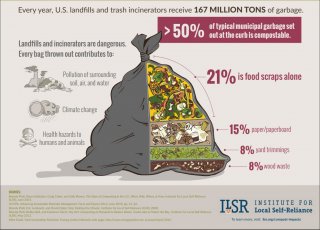Composting Food Waste: Keeping a Good Thing Going
October 2020
Food waste is a growing problem in our modern society. Approximately one third of the food produced worldwide never makes it to the table and ends up as waste, occupying around 25% of our ever- shrinking landfills. This is not just a food waste issue, it is also a waste of land, water, labor, energy, and even contributes to methane emissions, a potent greenhouse gas. Commercial composting is a great alternative to the disposal of food waste into landfills. Composting consists of combining organic waste with agents such as woodchips that accelerate decomposition, resulting in a nutrient rich soil that can be used as fertilizer. It is a resourceful way to turn food waste into a useful product which can help farmers increase their crop yields, provide a local resource for gardens, parks, and landscapers, restore habitats, and improve contaminated or degraded soils. In addition, composting lowers greenhouse gases by improving carbon sequestration in the soil and by preventing methane emissions through aerobic decomposition, as methane-producing microbes are not active in the presence of oxygen. The benefits of composting are many, and states are looking into diverting organic waste from entering landfills by increasing commercial composting practices.

Massachusetts was one of the first states to tackle the issue on a large scale. In 2014 Massachusetts passed a state-wide law to reduce the disposal of commercial organic waste. This law mandates any business or institution that disposes of one ton or more of food per week to divert the food waste into composting. This law has been very successful at lowering food waste entering landfills, thus reducing methane emissions and waste management costs. It has also led to significant economic activity by creating over 900 jobs and increasing the Gross State Product by $77 million as more composting facilities, food rescue organizations, and waste haulers are hired to keep up with demand.
Despite the great success of the law, there have also been some unintended consequences through increased nutrient pollution from composting facilities. In order to meet the demand for food waste composting capacity, the state relaxed regulations on new composting facilities. This has resulted in some facilities discharging nutrient rich leachate into local waterways, causing water quality impairments in numerous communities around Buzzards Bay. Municipalities have been working with public and private partners to invest in wastewater treatment upgrades to reduce nutrient pollution (wastewater treatment plants, innovative and alternative septic systems, but the impact of these efforts is getting offset by the introduction of the nutrient rich leachate from composting facilities.
Such is the case for the Town of Dartmouth, where the Slocums River, an already impaired waterway, has been affected by nitrogen pollution originating from composting facilities. Leachate samples collected from one of the composting facilities showed very high total nitrogen concentrations. As a result of this, the Town of Dartmouth was forced to take legal action, at the town's expense, to address this new form of nitrogen pollution. In the Town of Westport, composting facilities can operate without any local approval or oversight, even in cases where facilities are directly adjacent to waterways (see picture). These examples highlight the need for clear standards and oversight on new composting facilities to protect water quality and conservation efforts.

Everyone agrees that composting of commercial food waste has multiple benefits and it should continue. Producers of food waste need commercial composting in order to comply with the 2014 law, but the benefits of reducing food waste going into landfills should not create a new source of nutrient pollution to local waterways. The Buzzards Bay Coalition has decided to take action to find a solution to this problem. Funded by a Watershed Grant from SNEP, the coalition has planned a series of workshops to connect the commercial composting stakeholders with state and local communities. The goal is to understand the challenges and needs of each of the stakeholder groups (producers of food waste, commercial composters, and municipalities) and explore opportunities to improve the composting process. A third-party facilitator will be selected to achieve a consensus on clear local regulations that work for all constituents involved in this issue. Originally scheduled to start last winter and spring, the workshops were postponed to October 2020 due to COVID-19. In the meantime, the coalition has focused on reaching out to multiple stakeholders to start collaborating and get feedback on the project. After completion of this project, the Buzzards Bay Coalition will host a workshop targeted at all stakeholders to present suggestions on regulations and solutions to this issue next spring.
